Generally, things of higher value, or those things perceived as being of higher value, simply cost you more.
And that pretty much applies across the board from the place you call home, to the cars you drive, and to many of the consumables you buy as well.
But every once in a while, something comes along that becomes an exception to all this. Sometimes the exception is strictly a marketing ploy of some sort... to con you into believing you're getting more value for your hard-earned money than you really are.
For example, many automobile manufacturers compare their products to higher end vehicles.... These manufacturers might try to convince you their vehicle has all the bells and whistles comparable to the higher-end vehicle... but at half the price.
At first blush, you might start believing what they say is true.
But when you dig deeper, you may find their vehicle may have most of the tangible features of the luxury cars, but the quality doesn't come close. Or, when you test drive their vehicle, the road-feel is not anywhere near that of the more expensive vehicle.
This is by no means an endorsement for any auto brand, but simply an example of how value exceptions can sometimes end up being misleading... and how they really require you to be on your toes to watch out for them... to do your homework.
And in the complex world of nutritional supplements, it's important for you to know...
How Perceived vs. Actual Health Value Can Be Very Dicey
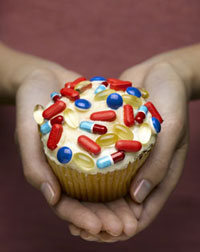
Don't be fooled by very low-priced
supplements. Many are made from
cheap, unhealthy synthetic ingredients.Many supplements claim to provide great benefits at very low prices. But when you dig deeper you often find out that cheap, synthetic ingredients were used.
Or, at the other end of the spectrum, the producers of more expensive supplements try to convince you a special process or hard-to-find ingredient is needed to justify the higher cost... in my opinion, often times this is simply a marketing ploy.
For every one that makes it through my rigorous acceptance gauntlet, dozens upon dozens more get rejected.
I truly believe that with what I'm about to show you, you'll see why I consider this to be one of the best health values for your money*... a true value exception with facts to back it up... a situation where I believe you simply will get more value for the same amount of money.
To get started, let's take a brief trip back in time...
The History Behind Fermented Foods and Their Health Benefits
History provides us a few clues on how different cultures promoted their intestinal health before modern times. Years ago, people used fermented foods like yogurt and sauerkraut - as food preservatives and as support for intestinal and overall health.

Ancient Indian culture (as well as today),
promoted intestinal health with a raw yogurt
drink called lassi - full of probioticsHere are a few examples...
- During Roman times, people ate sauerkraut because of its taste and benefits to their overall health.
- In ancient Indian society, it became commonplace (and still is) to enjoy a before-dinner yogurt drink called a lassi. These Indian traditions were based on the principle of using sour milk as a probiotic delivery system to the body.
- Bulgarians are known both for their health and their high consumption of fermented milk and kefir.
- In Asian cultures, pickled fermentations of cabbage, turnips, eggplant, cucumbers, onions, squash and carrots still exist today.
- People of the Ukraine consume probiotics from foods like sauerkraut, raw yogurt, and buttermilk.
The interesting thing was most of these dietary habits were born from tradition... at the time, no one really knew or understood why they were so healthy to your digestive system.*
How Probiotics Got Their Start - An Uphill Battle
Against Big Pharma
Well, things changed in the early 1900s, when Russian scientist Elie Metchnikoff (Nobel Prize 1908) proposed that the Balkan population enjoyed excellent health due to consumption of large quantities of fermented milks containing beneficial bacteria.*
These 'good' bacteria were later defined as probiotics, which comes from Greek terminology meaning 'for life.'
In the 1950s, the USDA licensed a probiotic formula for use in the digestive tract of pigs. Later on in the 1970s, the effectiveness of the probiotics in that role in pigs was discovered. Probiotics were later pioneered for human use.
So, what took so long to bring probiotics to the forefront in human health enhancements?*
I believe that the mere fact that large pharmaceutical companies were able to leverage millions of dollars to market their products pushed probiotics out of the way... relegated them to the back-burner.
But today, the health trend has clearly begun to shift toward natural nutrition. And that has allowed probiotics to resurface and gain the attention they deserve.
And that's why I spend so much of my time researching factual data on how to provide you with the best probiotic formula available.
All this is well and good, but...
Why Are Probiotics So Vital to Your Health?*

Why do many caesarean-section infants have
less-than-optimal health after birth?From the very first breath you take, you're exposed to probiotics.
How so?
On the way through the birth canal during a normal delivery, a newborn gets dosed with bacteria from their mother. This event starts colonization in the infant's gastrointestinal (GI) tract of 'good' bacteria. Compelling new research now shows many caesarean-section infants have less-than-optimal health after birth. This is most likely because they are not exposed to the mother's healthy bacteria in the birth canal which would then serve to populate its own GI tract.
As you mature, you're faced with many threats to the beneficial bacteria in your gut... from chlorinated drinking water... to overly-processed foods.
The 'good' bacteria in your gastrointestinal system can only provide you with optimum health if the proper balance of different types of bacteria is maintained in your gut.*
This is where probiotics can have a profound effect... not just on your GI health, but on your overall health as well.* Keep in mind, 80% of your immune system actually lives in your gut.
Probiotic formulas are available with many different types of bacterial strains... with the most common being Lactobacillus acidophilus. But as you'll find out shortly, not all probiotics are created equal... and not all probiotic formulas are properly produced to provide optimal benefits.*
In general, if formulated properly, the major benefits of a high-quality probiotic are to...
- Aid you in digesting food, particularly hard-to-digest foods and foods to which some individuals are more sensitive.*
- Enhance the synthesis of B vitamins and improve calcium absorption*
- Help you keep a healthy balance of intestinal microflora*
- (In women) Promote vaginal health*
- Support your overall immune function*
And more...
I strongly believe the key to an optimal probiotic formula is through science-backed research by a qualified non-biased laboratory... and through a manufacturer with rigorous high-quality process standards in place.
You'll see more evidence of this unwavering belief I have coming up...
When's the Best Time to Take a Probiotic Supplement?
One of the confusing issues with probiotic supplements hinges around timing... when is the best time to take them?
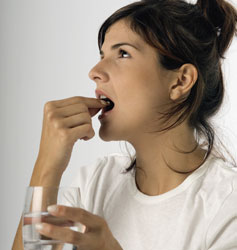
When's the best time to take a probiotic?
See my recommendations hereRecommendations are pretty much all over the place on the best time to take them around meal times.
I can tell you when it comes to this, my team and I have carefully researched this issue and even consulted with the one of the foremost authorities and pioneers on probiotics...
The bottom line... my recommended approach and timing for taking a probiotic supplement are...
- Take it prior to eating breakfast with a glass of pure water
- Wait 10-15 minutes after taking it before you eat because stomach acid from your meal could impact some of the 'good' bacteria (you could lose 5-10%)
- Avoid taking it within 3 hours of taking any antibiotic
And talking about meals and probiotics, something I hear quite often is...
"If I Eat Yogurt, Should I Still Take Probiotics?"
You are probably wondering why using nearly any commercial yogurt might not be as beneficial as a probiotic supplement. After all, traditional cultures have been consuming cultured, fermented foods like yogurt for years for digestive health promotion.
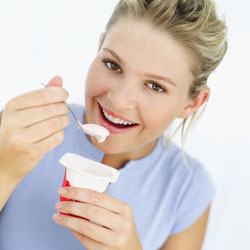
Most commercial yogurts are not a good source
of probiotics. Heat pasteurization significantly
reduces most of the 'good' bacteria benefitsThe problem arises because...
- Traditional yogurts were phenomenal sources of beneficial bacteria due to their raw and unpasteurized state.
- Most of today's yogurts are pasteurized, unless specially purchased raw and unpasteurized from a local farmer. Sadly, pasteurization radically reduces most of the benefits.
- Even most of the yogurts certified organic by the USDA are pasteurized in some fashion.
So what, in my opinion, is wrong with pasteurization?
Well, it basically kills or sterilizes most of the beneficial and other bacteria during the heat processing. And some yogurts (particularly the frozen ones), don't contain any live bacteria at all.
So, as great-tasting as many of them are, don't be fooled by yogurt products advertising live cultures beneficial to your digestive system... many have likely had the beneficial bacteria already reduced or wiped out by heat-intensive pasteurization processes.
To me, this is one of those cases where it appears that in our collective zeal to rid ourselves of every trace of infectious agents in our food supply and homes, we may have outdone ourselves.
As a whole, we're less exposed to bacteria now than in the past, including beneficial bacteria. Antibacterial products, hand sanitizers, and the like have made for a world that's a whole lot cleaner, but is it really that much healthier?
Due to strict food safety regulations, less bacteria (including the 'good' ones) survive the manufacturing process. Many overly-processed products, just like yogurt, undergo pasteurization or sterilization, which may destroy beneficial bacteria.
While this may be helpful in some ill-health prevention, it also means we are exposed to less health-enhancing bacteria.*
And with helpful bacteria less available in our food, I'm even more convinced how crucial it is to consider supplementation with high-quality probiotics.
But, I first must raise the caution flag and give you fair...
Warning: Make Sure You Get the High-Quality Solution
So, how do you go about finding a high-quality probiotic supplement?
First of all, before we're through, I'll help dispel some of your guess-work with my findings on some of the latest probiotic discoveries... and provide my recommendations as well.
But before I do that, there are some key factors I feel differentiate the good probiotic formulas from those that are questionable... and may even be a waste of your money.
Basically, without the following key factors, any probiotic formula can be suspect at best, unless it...
- Contains effective bacterial strains - it must be strain specific*
- Is viable and dose specific
- Remains stable and viable for long period of time
- Has the ability to survive the stomach and into the intestine
- Produces beneficial effects and thrives in the intestine*
This complicates the world of probiotics a bit because there are so many manufacturers out there making claims on digestive health promotion.
But you don't need to fall for any of the misconceptions... I'll help you dig through the maze and minutia as we go.
If Your Probiotic Formula Does Not Contain THIS, In My Opinion, You Shouldn't Waste Your Time
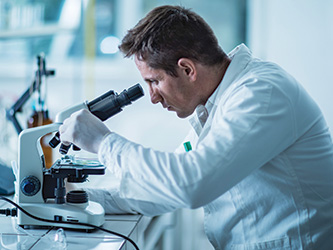
If your probiotic does not contain this specific
lactobacillus acidophilusbeneficial strain (DDS-1), you could
be wasting your timeOne of the key formulation factors in a probiotic supplement that I already mentioned, is it must contain effective bacterial strains.* Now, as you can imagine, this is a rather complex issue.
But of all the strains produced over the years, there is one I believe exceeds all others... and to me, if the probiotic formula does not contain this strain, well quite frankly, you're not getting your best health-bang for the buck.*
I no longer consider taking a probiotic as part of my daily regimen without this strain!
This strain has the distinction of being one of the few bacterial species for which probiotic attributes have been shown to be effective.*
So what is this strain?
Lactobacillus acidophilus DDS-1 is the name of this highly effective strain of beneficial bacteria*... and the 'DDS-1' is really important. There are other strains of Lactobacillus acidophilus out there, but without the DDS-1 specificity, your potential health benefits could come up short.*
It has been found that this specific probiotic strain possesses vital properties important to human health.* Research at a major Midwestern university showed how DDS-1 enhanced human health because it colonized well in the human gut.*
Research and studies suggest DDS-1 can be effective toward enhancing human health because it...
- Adapts well to the human body because of its human origin
- Is acid and bile resistant for intestinal survival
- Helps promote your digestive health*
- Aids in supporting your immune system*
- Contributes to the good balance of your intestinal flora*
- Produces significant quantities of lactase to potentially aid in lactose intolerance challenges*
I'm convinced Lactobacillus acidophilus DDS-1 is one of the important and necessary strains in an effective probiotic supplement.* Without it, I believe you're not maximizing the potential of using this type of supplement.
But it's one thing to just explain how DDS-1 potentially enhances your health*... it's another to provide examples of clinical trials and research that provide compelling evidence...
Probiotic Superstrain - A Study in Health-Boosting Benefits*
Over the years, several studies have demonstrated the diverse effectiveness of DDS-1 and help validate its potential use as a probiotic.* Here are a few examples...
- From major Midwestern University and prestigious health center (2010) - Conducted a review of case studies to determine whether using a multispecies probiotic with DDS-1 could enhance bowel health.
Results: After 60 days of treatment, most showed significant improvement in abdominal health, bloating and occasional elimination irregularities.* This study suggests that DDS-1 may help create a healthy balance of microflora in the gastrointestinal tract.*
- From Gut (2003) - DDS-1 helped to support the health of human epithelial cell lines when evaluated as part of a probiotic blend. *
- (1997) - In animal research, isolated evaluation of DDS-1 supported the normal production of immune components.* DDS-1 performed this better than three other strains of Lactobacillus acidophilus or Bfidobacterium bifidum.*
These are but a few examples why I believe DDS-1 plays a key role in optimal health when you use a probiotic supplement.*
Don't Spend Potentially More on a High-Quality Probiotic
If You Don't Have to...
One controversial area of discussion involving probiotic supplements involves survivability.
By survivability, I mean the ability of the 'good' bacteria released by the supplement to survive and reproduce in your intestinal tract.
Why is this so important?
Well, if the beneficial bacteria are destroyed by your stomach acid and intestinal bile, your GI tract won't be able to take advantage of the potential health benefits.*
Many theories abound on how to solve this... many I believe are not necessary and just waste your money. This gets back to the value perception issue once again.
Many probiotic manufacturers want you to believe that a special type of coating, called enteric coating, is necessary for the beneficial bacteria to survive. Basically, enteric coating is a type of layer put on the capsule itself to supposedly ensure survival of the beneficial bacteria in your GI tract.
I have several issues with enteric coating that can be summed up as follows...
- It's an expensive process - The cost you pay for a high-quality enteric coated probiotic supplement with significant numbers of CFUs often becomes highly inflated due to the expensive enteric coating process.
- In my opinion these enteric coatings are unnecessary for GI survival - According to probiotic experts, selecting specific acid and bile resistant strains coupled with high-quality manufacturing processes, negate the need for enteric coating. In fact, the process of enteric coating could potentially reduce the viability of live beneficial bacteria altogether.
- Many enteric coatings use synthetic ingredients - There are few uses of natural enteric coating because this adds even more cost. Most enteric coated probiotics are treated with a polymer of acrylic acid... a synthetic chemical often sprayed onto the capsule.
And what about raw, unpasteurized yogurt, sauerkraut, fermented milk and kefir consumed as traditional foods for generations to boost digestive health? The beneficial probiotic bacteria within these foods have not had difficulties surviving stomach acid and intestinal bile.
So, why would a high-quality probiotic supplement require some sort of coating to enhance the survivability of the contents?
Well, in my opinion, it doesn't. And I believe the added cost is not only an unnecessary expense to you, but may be an added health detriment as well... if the coating is synthetic.
Many probiotic manufacturers have created a perception of greater value to justify the higher cost of their enteric coated probiotics. Guess what? In my opinion, the value is not there so you can simply just avoid them.
I'll show you what I consider to be a much more robust and less costly solution coming up...
Little-Known Complement Adds 'Spice' to Probiotic Formula
With much of the attention focused on probiotics, there is a little known complement to probiotics called prebiotics that play an important role in your digestion.*

Pure raw honey is an excellent source of prebioticsSo, what are prebiotics?
Prebiotics help keep beneficial bacteria healthy.* They basically are non-digestible foods that end up in your digestive system to help beneficial bacteria (probiotics) grow and flourish.*
The prebiotics that feed the 'good' bacteria in your GI tract primarily come from carbohydrate fibers called oligosaccharides that you don't digest.* They remain in your digestive system to help boost the growth of beneficial bacteria.*
Natural sources of prebiotics include …
- Fruits...
- Raw Honey...
- Legumes...
I believe adding prebiotics to a high-quality probiotic benefits the entire formula.* But this is a complex process and not easily produced at an economically feasible cost... until now.More coming up on how my probiotic solution provider has found a solution for this. But first...
If You're Currently Taking Or Are Considering Taking Probiotics, I Recommend That You Make Sure It Has These...
Here's my list of 'must-haves' in a probiotic formula. And if you're familiar with my current probiotic formula on my site, you'll recognize some identical requirements and some new ones as well.
See, as time goes on, research and technology are creating moving targets of improvement in probiotics... and I want to make sure you have every opportunity to take advantage of newly uncovered health-promoting properties.*
Now, to the demanding list... my 'must-haves' in a probiotic formula...
 | Contains specific super-strain Lactobacillus acidophilus DDS-1 |
 | Shows high potency through independent lab test |
 | Works together with prebiotics for improved probiotic performance* |
 | Is stable at room temperature for at least 2 years |
 | Is non-dairy, free from soy, corn, wheat, and gluten, and is non-GMO |
 | Helps maintain a healthy flora, promotes digestion, and supports immune function* |
 | Adapts naturally to the human body due to its human origins |
 | Is acid and bile resistant to naturally survive the stomach and intestinal transit |
 | Produces natural enzymes, vitamins, lactic acid, and hydrogen peroxide |
 | Utilizes nitrogen packaging and is freeze-dried |
 | Comes available in vegetable-based capsules |
 | Is backed by academic and scientific research with patents and trademarks, and awards |
|
Now, you can use these rigorous criteria to find a probiotic formula that matches up... but you'll probably have a difficult time.
Why is that?
Well, I set the bar about as high as I could based on new data my team and I uncovered. I really didn't expect to find any formula satisfying all of the requirements. At this point, you probably agree how challenging this is as well.
But, all I can say is I was pleasantly surprised when I found a new innovative formula that not only nailed my requirements, but exceeded them as well.
Here's what I found...
A Formula So Robust It Has Become a Cornerstone in
My Daily Supplement Regimen
You don't need to look any further. My new Complete Probiotics is the best of the best in providing everything I was looking for... and more.
Not only will it eventually completely replace the current probiotic formula on my site, it will immediately become part of my personal daily regimen... a rare occasion at best. In fact, I view high-quality probiotics as more important than a multi-vitamin.
Here's a breakdown of the 10 specific beneficial bacteria strains in Complete Probiotics to deliver health-promoting benefits...*
 | Lactobacillus acidophilus DDS-1 - You already know the extraordinary benefits of this superstrain. Because it is of human origin, it works exceptionally well in your GI tract.* |
 | Lactobacillus casei - Works with other helpful organisms, and helps to encourage the growth of other beneficial bacteria.* |
 | Lactobacillus plantarum - Has been shown to be resistant to low pH conditions and able to survive bile concentrations in your intestine.* |
 | Lactobacillus salivarius - Promotes intestinal health and helps support your oral health as well.* |
 | Lactobacillus rhamnosus - Assists your elimination and occasional intestinal discomfort by working to promote healthy intestinal microflora.* |
 | Lactobacillus brevis- Beneficial lactic acid bacteria that helps support your GI tract.* |
 | Bifidobacterium lactis- A friendly bacteria often found in raw yogurt known to help support healthy immune responses.* |
 | Bifidobacterium longum- Helps keep your digestive system running smoothly, and helps support your immune system.* |
 | Bifidobacterium bifidum- Helps promote a healthy balance of flora in your intestine.* This organism provides excellent support for a healthy balance of microflora.* |
 | Streptococcus thermophilus- High potency culture that helps maintain normal intestinal flora in your gut.* |
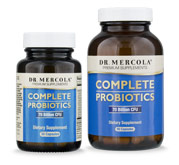
Just as important as what specific beneficial strains are in Complete Probiotics are the strains purposely left out. The formulator eliminated Lactobacillus bulgaricus due to its possible antagonistic effects on Lactobacillus acidophilus DDS-1. And they removed the Lactospore strain as well, in favor of more preferable strains.
Plus, Complete Probiotics now have beneficial prebiotics in the form of Fructooligosaccharide (FOS).* This was not an easy task. But the chosen manufacturer already recognized the importance and health benefits when complementing probiotics with prebiotics... a total win-win scenario for you.*
As you already probably know, I've had a very good probiotic formula on my site for some time. Well, this new Complete Probiotics formula will now replace it.
Here's more on how the new Complete Probiotics totally shines...
Bile and Acid Resistance - The Proof is in the Test Results
Another area my new Complete Probiotics proves its weight in gold is in acid and bile tolerance.
You already know my feelings on enteric coating and how I believe it's a waste of your time and money. Well, the chart below shows you how well the strains that make up the Complete Probiotics formula resist and survive stomach acid and intestinal bile.
Very few manufacturers I looked at could actually provide testing info on the survivability of the specific strains in their formulas. If they could not demonstrate results, I passed them up.
Keep in mind, without these strains adequately resisting stomach acid and intestinal bile, your health benefits from the probiotic will likely be severely lacking.
Through testing, some Complete Probiotics strains demonstrated gastrointestinal acid and bile tolerances over 90%. So, don't waste your money on enteric-coated formulas.
Here's the test results...
| Probiotics Strains | Acid Tolerance | Bile Tolerance |
| Lactobacillus acidophilus | ++++
(>90% survival in HCL and pepsin (1%)
at pH3 for 1 h at 37C ) | ++++
(>90% survival in 0.3% in bile salt containing medium) |
| Lactobacillus plantarum | ++++
(>90% survival in HCL and pepsin (1%)
at pH3 for 1 h at 37C ) | ++++
(>90% survival in 0.3% in bile salt containing medium) |
| Lactobacillus casei | ++++
(>90% survival in HCL and pepsin (1%)
at pH3 for 1 h at 37C ) | ++++
(>90% survival in 0.3% in bile salt containing medium) |
| Bifidobacterium lactis | ++++
(>90% survival in HCL and pepsin (1%)
at pH3 for 1 h at 37C ) | ++++
(>90% survival in 0.3% in bile salt containing medium) |
| Bifidobacterium bifidum | ++++++ | ++++ |
| Lactobacillus rhamnosus | +++
(>70% survival in HCL and pepsin (1%)
at pH3 for 1 h at 37C ) | ++++
(>80% survival in 0.3% in bile salt containing medium) |
| Lactobacillus salivarius | +++
(>70% survival in HCL and pepsin (1%)
at pH3 for 1 h at 37C ) | ++++
(>80% survival in 0.3% in bile salt containing medium) |
| Bifidobacterium longum | +++
(>70% survival in HCL and pepsin (1%)
at pH3 for 1 h at 37C | ++++
(>80% survival in 0.3% in bile salt containing medium) |
| Streptococcus thermophilus | +
(>60% survival in HCL and pepsin (1%)
at pH3 for 1 h at 37C ) | ++++
(>90% survival in 0.3% in bile salt containing medium) |
| Lactobacillus brevis | ++++++ | ++++ |
| Legend: |
| ++++ Excellent | +++Very Good | ++ Good | + Fair |
Note: "Complete Probiotics" contains 80% probiotics strains that are >90% acid and bile resistance.
Since I'm replacing the current probiotics formula on my site with this one, let's take a look at some of the key areas that separate the two formulas...
How My New Formula Clearly Brings Added Value
One thing I achieved with the new Complete Probiotics formula is providing you a higher health value probiotic at about the same price as the current formula.
This is certainly not a marketing spin or ploy, and you'll see shortly how what you'll pay for Complete Probiotics is not an increase over the previous formula... plus, in my opinion, you'll be getting so much more value for your overall health.*
Here are just some of the key areas in which I improved the formula to provide you even more real probiotic value...
| Key Comparison Items | New Complete Probiotics | Current Probiotic Formula |
| Colony forming units (CFU) per capsule - measurement of viable microbes (beneficial bacteria) in the probiotic. | A minimum of 70 billion CFU per serving are guaranteed through the product expiration date. However, to compensate for storage temperature variances, up to 90 billion CFU are packed into each capsule to enhance potency throughout shelf life. | 66 billion CFU per capsule. |
| 10 beneficial probiotic strains? | Yes - And 2 marginal strains (L. bulgaricus and lactospores) replaced with more effective strains.* | Yes - Actually 11 strains but 2 of the strains (L. bulgaricus and lactospores) have since been shown to provide only marginal benefits. |
| Lactobacillus acidophilus DDS-1 specific strain? | Yes - Included in the robust formula is the DDS-1 specific strain. | Lactobacillus acidophilus strain comes in the formula but not specifically DDS-1. |
| Fortified with prebiotics? | Yes - Fructooligosaccharide (FOS) prebiotic used to boost the formula and overall GI benefits.* | Prebiotics are not included in this formula. |
The bottom line... I believe you get more health value with the new Complete Probiotics formula as compared to the current formula, and it won't cost you more.* This is truly one of those times where the value exception is real and not just a marketing illusion.
Taking It Along When You Travel

Whenever I travel, I always take along the best
probiotic formula I know of to help keep my GI tract in
optimal shapeWhen it comes to probiotics, I've always taken my best formula along whenever I travel... particularly, when I travel outside the US.
Why?
Well, when you visit other countries, there's always a chance your digestive system can be sensitive to different foods (e.g., spices) that you are not used to. This can cause not only occasional digestive discomfort, but may stress you out as well.
Who wants to be in another country either on business or vacation, and have to deal with occasional digestive discomfort? Well, I certainly don't... and that's why I take along a high-quality probiotic to help make sure my GI tract is in optimal shape.*
And with Complete Probiotics you have what my team and I consider to be the best probiotic formula we could find and it's perfect for traveling because it...
- Has a shelf life of 2 years at room temperature - Unlike some other probiotic formulas with shorter shelf lives, Complete Probiotics is stable longer at room temperature.*
- Can help you during times of digestive stress* - If while traveling, your GI tract is affected by new and exciting foods (e.g., spices), you can take additional servings (recommended 4-6 capsules) to help give your digestive system the additional support it needs.*
- Becomes part of your travel pack - Conveniently fits into any travel pack you bring along on your trip.
With the new Complete Probiotics formula and all of its distinct health advantages, I plan to never travel without it.* I recommend you consider doing the same.
When it comes to producing a top probiotic supplement, there's one area I never take shortcuts on and never underestimate the...
Critical Importance of a High-Quality Manufacturer
Without an excellent manufacturer who practices the highest-quality standard practices, I believe any probiotic formula's stability and longevity would be suspect at best.
Well, I not only will tell you how the manufacturer of Complete Probiotics is one of the finest I've encountered, I'll disclose the type of evidence I uncovered that totally convinced my team and me.
Here's a list of impressive milestones this manufacturer has achieved and built its reputation on since it became a probiotic pioneer in 1979...
- First to introduce Lactobacillus acidophilus DDS-1 commercially
- First to introduce quality control standard CFU/gm, now used worldwide
- First to introduce non dairy, gluten free, and non-GMO probiotics
- First to introduce nitrogen packaging to enhance stability
- First to introduce acid and bile resistant probiotics
- First to introduce the combination of probiotics with prebiotics
To go along with all these ‘firsts,’ my manufacturer of choice has also received many awards, with one of the most recent and prestigious being the...
- 2010 Frost & Sullivan Award for “Customer Value Enhancement of the Year” in the North American probiotics market
Frost & Sullivan is known worldwide for its innovative research, analysis, and marketing expertise. Based on its recent analysis of the probiotics market, Frost & Sullivan recognized our selected manufacturer for their innovations in quality control and probiotic products to address specific areas of health.*
- Said a Frost & Sullivan Senior Research Analyst referencing this award..."In the crowded probiotics market, where multiple manufacturers offer different products with generic health claims, growth is driven by specific validated claims for your products..."
It's clear to me, and one of the compelling reasons why I selected them, that the producer of Complete Probiotics is driven to deliver specific beneficial strains (like DDS-1) to improve your GI health*... and the Frost & Sullivan award further supports their innovative drive.
The DDS-1 superstrain of Lactobacillus acidophilus, held as both a patent and US trademark by this high-quality company since 1979, has been crucial to driving growth and further innovation... just the type of company I want to produce Complete Probiotics.
How This Formula Stacks Up Against My Demanding Must-Have Criteria
Let me summarize many of the advantages of the new Complete Probiotics using my rigorous must-have selection criteria (from above)...
| Selection Criteria | Complete Probiotics? |
| Contains specific super-strain Lactobacillus acidophilus DDS-1? |  Yes - The manufacturer holds patent and US trademark on DDS-1. Yes - The manufacturer holds patent and US trademark on DDS-1. |
| Shows high potency through independent lab test? |  Yes - Guaranteed to provide a minimum of 70 billion CFU and as many as 90 billion to ensure potency throughout shelf life. Yes - Guaranteed to provide a minimum of 70 billion CFU and as many as 90 billion to ensure potency throughout shelf life. |
| Works together with prebiotics for improved probiotic performance? |  Yes -The manufacturer successfully added intestinal-beneficial prebiotics to complement the probiotics.* Yes -The manufacturer successfully added intestinal-beneficial prebiotics to complement the probiotics.* |
| Is stable at room temperature for at least 2 years? |  Yes - Provides flexibility with storage and travel needs at room temperature. Yes - Provides flexibility with storage and travel needs at room temperature. |
| Is non-dairy, free from soy, corn, wheat, and gluten, and is non-GMO? |  Yes - One of the industry innovators and first to accomplish this. Yes - One of the industry innovators and first to accomplish this. |
| Helps maintain a healthy flora, promotes digestion, and supports immune function?* |  Yes - Performs this extraordinarily well with strain specific probiotics and prebiotics.* Yes - Performs this extraordinarily well with strain specific probiotics and prebiotics.* |
| Adapts naturally to the human body due to its human origins? |  Yes - Soil and animal-origin microorganisms are not natural inhabitants of the human body. Yes - Soil and animal-origin microorganisms are not natural inhabitants of the human body. |
| Is acid and bile resistant to naturally survive the stomach and intestinal transit? |  Yes - Testing has demonstrated high survivability of beneficial bacteria. Yes - Testing has demonstrated high survivability of beneficial bacteria. |
| Utilizes nitrogen packaging and is freeze-dried? |  Yes - Takes advantage of these innovative processes to help ensure stability. Yes - Takes advantage of these innovative processes to help ensure stability. |
| Comes available in vegetable-based capsules? |  Yes - Provides this delivery. Yes - Provides this delivery. |
| Is Generally Recognize as Safe (GRAS)? |  Yes - GRAS notification was filed with the FDA and the agency stated no objection. Yes - GRAS notification was filed with the FDA and the agency stated no objection. |
| Is backed by academic and scientific research with patents and trademarks, and awards? |  Yes - DDS-1 patent and US trademark, and many awards including 2010 Frost & Sullivan Yes - DDS-1 patent and US trademark, and many awards including 2010 Frost & Sullivan |
Well, it's clear to me that not only does Complete Probiotics pass my demanding criteria for a high-quality probiotic formula, but in my opinion, it also delivers more health value than the previous offering on my site...* all for about the same price.
This formula will now move to the top of my must-take list... as I plan to take it every day. I only take a few supplements and this is one that I take EVERY morning on an empty stomach 30 minutes before I eat...
Don't Spend More Than You Have To - Take the High-Quality Probiotic
Already Added to My Daily Regimen
So, Complete Probiotics offers you a true value exception.
I believe you can see the value in this incredible probiotic formula. I've completely avoided any artificial and potentially risky synthetic ingredients... so this is certainly not a cheap, low-end formula.
And, I've shown you how to avoid excessively-priced probiotics... like the ones claiming you need some sort of special coating to survive your stomach and intestinal transit. Don't waste your hard-earned money on those.
What's left is Complete Probiotics, and at $29.97 for a 30-day supply, you can see how my team and I worked hard to provide you this extraordinary added-value at a reasonable price... comparable to the previous offering on my site.
If you're serious about improving your digestive health as well as your overall health, order Complete Probiotics today.*
And remember, about 80% of your immune system lives in your GI tract. So, do yourself a favor and order Complete Probiotics to help take charge of your health.*
And don't forget about my money-back guarantee (see below). I've taken most of the risk out of you trying this powerful probiotic formula. Order Now!










